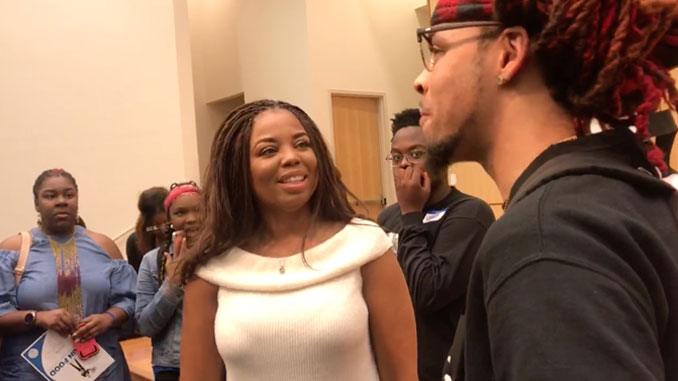
By Temitayo Odulaja
Acclaimed Sports Journalist Jemele Hill elaborated on the struggles and triumphs that eventually made her a prominent sports personality. She spoke at the Brain Food Series at Dillard University’s Georges Auditorium on April 8th. Hill, who now works for ESPN’s The Undefeated made national headlines when she denounced President Donald Trump on social media as a White Supremacist in 2017. President Trump responded that “ESPN is paying the price of its politics” after calling for Hill to lose her job. Hill said her upbringing prepared her for the tough year she had in the news and her journey to this point in her career.
“I grew up in the hood of Detroit and my father and I were estranged,” said Hill, a nominee of the 49th NAACP Image Awards. However, her separation from her father is what shaped her, not just as a sports expert, but as a woman.
“It helped me get through college,” said Hill, who attended Michigan State University on a scholarship, and studied Mass Communication and Spanish. College led her to her career path, as it exposed her to an array of opportunities to explore her gifts and abilities.
“College made me critically think,” she said. It was her start for questioning why certain things were happening in society.
She developed her enthusiasm for sports at a very young age, she told the audience. She, like every sports zealot, would read sports columns to keep in touch with the latest statistics.
“I began my journalism career early and I did five internships before graduating,” she said. “When I said I wanted to be a sports writer, everyone thought I was crazy, no one knows any sports writer,” she said.
However, such criticism did not come from her “inner circle,” so it was easy for her to dismiss the negative opinions.
“I never put myself in any situation where I did not have many choices,” she said.
She encouraged the audience not to limit themselves, but rather explore several options. Hill said no one can truly realize what they are skilled in, unless they engage in it.
“I never wanted to work for ESPN, my dream job was to work for Sports Illustrated,” she said. Eventually, at 22, she was offered a position at Sports Illustrated as a sports writer.
“A lot of things will happen that will take you down a different path, but that does not necessarily mean that it would take you to a bad path,” she said.
She urged the students to continue to practice hard at what they are passionate about.
“Do what you would do even if you would not get paid, that comes later,” she said. “What would you do for free, I would write for free,” Hill said.
Her journey of overcoming trials and reaching success was the reason Dillard University President Walter Kimbrough said he wanted Hill to speak to students and the community.
“There have been speakers who have made students here go on to grad school,” Kimbrough said. “We are giving back to society,” he said of the Brain Food Series.
The program exposes students to diverse prominent figures that would affect their academic journey positively, said Sheryl Haydel, Dillard’s Director of Communications and Marketing.
“Brain food allows students at this university to have a taste of what occurs in big schools,” Haydel said.
“I think she is very relatable,” Haydel said of Hill and her experiences. “Brain food is very important because of the information the students can learn,” she said.
Recommended For You.



Be the first to comment